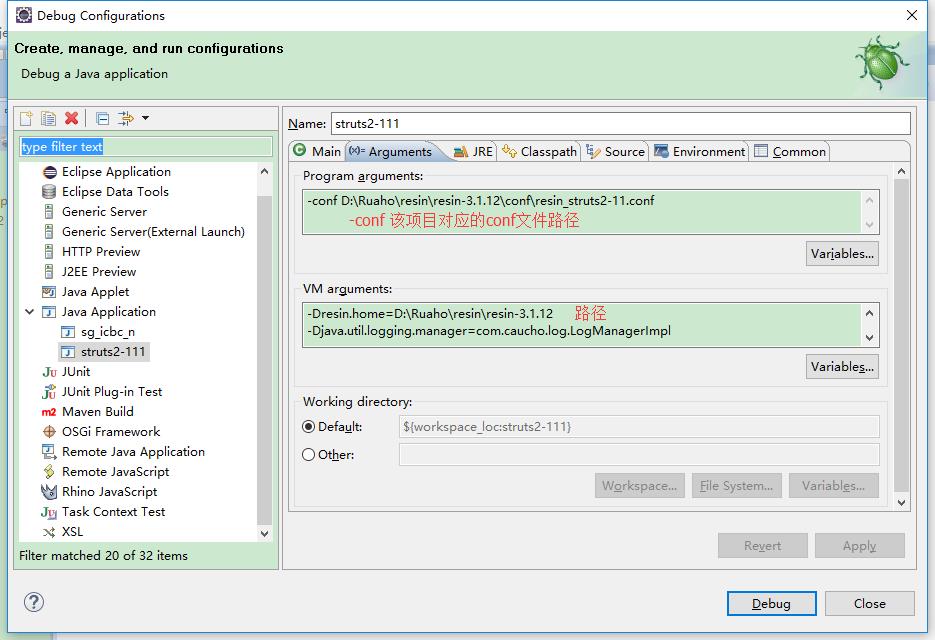基于windows的resin配置
Posted 在路上的牛小牛
tags:
篇首语:本文由小常识网(cha138.com)小编为大家整理,主要介绍了基于windows的resin配置相关的知识,希望对你有一定的参考价值。
Resin 与 Eclipse for JavaEE 的整合方法:
1.新建一个项目,将web application配置到resin.conf中
附上resin_struts2-111.conf文件:(为方便区分我将这个conf文件命名为resin_项目名.conf)
<!-- - Resin 3.1 配置文件. --> <resin xmlns="http://caucho.com/ns/resin" xmlns:resin="http://caucho.com/ns/resin/core"> <!-- 加载resin/lib下的所有.jar文件 --> <class-loader> <tree-loader path="${resin.home}/ext-lib"/> <tree-loader path="${resin.root}/ext-lib"/> <tree-loader path="${resin.home}/lib"/> <tree-loader path="${resin.root}/lib"/> </class-loader> <!-- 管理配置 --> <management path="${resin.root}/admin"> <user name="admin" password="password" disable="true"/> <resin:if test="${resin.professional}"> <deploy-service/> <jmx-service/> <log-service/> <xa-log-service/> </resin:if> </management> <!-- -JDK日志接口的配置 - --> <log name="" level="info" path="stdout:" timestamp="[%H:%M:%S.%s] {%{thread}} "/> <!-- 日志信息的级别:\'info\' 生产环境 \'fine\' 开发环境 \'finer\' 调试环境 --> <logger name="com.caucho" level="info"/> <logger name="com.caucho.java" level="config"/> <logger name="com.caucho.loader" level="config"/> <!-- - 环境上下文的检测时间,对于生产站点, 这个要设置长一点,例如600秒,10分钟 --> <dependency-check-interval>2s</dependency-check-interval> <!-- - 发送邮件通知的SMTP服务器 --> <system-property mail.smtp.host="127.0.0.1"/> <system-property mail.smtp.port="25"/> <!-- - Sets the default character encoding to utf-8 - - <character-encoding>utf-8</character-encoding> --> <!-- -你可以把编译器改成 "javac", "eclipse" 或者 "internal". --> <javac compiler="internal" args="-source 1.5"/> <!-- Security providers. - <security-provider> - com.sun.net.ssl.internal.ssl.Provider - </security-provider> --> <!-- 去掉注释,如果你使用resin提供的xml应用 - - <system-property javax.xml.parsers.DocumentBuilderFactory - ="com.caucho.xml.parsers.XmlDocumentBuilderFactory"/> - <system-property javax.xml.parsers.SAXParserFactory - ="com.caucho.xml.parsers.XmlSAXParserFactory"/> --> <cluster id="app-tier"> <!-- 设置集群上下文的根, 相对于server.root --> <root-directory>.</root-directory> <server-default> <!-- HTTP服务的端口 --> <http address="*" port="8001"/> <!-- - SSL端口配置: - - <http address="*" port="8443"> - <openssl> - <certificate-file>keys/gryffindor.crt</certificate-file> - <certificate-key-file>keys/gryffindor.key</certificate-key-file> - <password>test123</password> - </openssl> - </http> --> <!-- - JVM参数设置 --> <jvm-arg>-Xmx256m</jvm-arg> <jvm-arg>-Xss1m</jvm-arg> <jvm-arg>-Xdebug</jvm-arg> <jvm-arg>-Dcom.sun.management.jmxremote</jvm-arg> <!-- - Uncomment to enable admin heap dumps 去掉这个如果你想管理内存堆的倾倒 - <jvm-arg>-agentlib:resin</jvm-arg> --> <!-- - arguments for the watchdog process --> <watchdog-jvm-arg>-Dcom.sun.management.jmxremote</watchdog-jvm-arg> <watchdog-port>6600</watchdog-port> <!-- - 强制resin强制重起时的最小空闲内存 --> <memory-free-min>1M</memory-free-min> <!-- 最大线程数量 --> <thread-max>256</thread-max> <!-- 套接字等待时间 --> <socket-timeout>65s</socket-timeout> <!-- 配置 keepalive--> <keepalive-max>128</keepalive-max> <keepalive-timeout>15s</keepalive-timeout> <!-- -如果使用的是UNIX,这里是启动的帐号和用户组. - - <user-name>resin</user-name> - <group-name>resin</group-name> --> </server-default> <!--定义群集服务器--> <server id="" address="127.0.0.1" port="6800"/> <!-- -配置独立服务器或者群集的持久化存储,专业版的功能 --> <resin:if test="${resin.professional}"> <persistent-store type="cluster"> <init path="session"/> </persistent-store> </resin:if> <!-- -为了安全, 你可以为SSL会话(SSL sessions)定义一个不同的cookie. - <ssl-session-cookie>SSL_JSESSIONID</ssl-session-cookie> --> <!-- - 缓存启用 (专业版的功能) --> <resin:if test="${resin.professional}"> <cache path="cache" memory-size="64M"> <!-- Vary header rewriting for IE --> <rewrite-vary-as-private/> </cache> </resin:if> <!-- - 启用周期性的服务器状态检查和死锁检查,所有的服务器可以添加 <url> 来检查。 --> <resin:if test="${resin.professional}"> <ping> <!-- <url>http://localhost:8080/test-ping.jsp</url> --> </ping> </resin:if> <!-- - Defaults applied to each web-app. --> <web-app-default> <prologue> <!-- -扩展库的公共jar文件,扩展是安全的即使没有类装载器知道的jars,装载的类将为每个应用分别装载,也就是这些类都是不同的 --> <class-loader> <tree-loader path="${resin.root}/ext-webapp-lib"/> </class-loader> <!-- - 启用EL表达式 --> <allow-servlet-el/> </prologue> <!-- - 设置缓存页、静态也的延时值 --> <cache-mapping url-pattern="/" expires="5s"/> <cache-mapping url-pattern="*.gif" expires="60s"/> <cache-mapping url-pattern="*.jpg" expires="60s"/> <cache-mapping url-pattern="*.png" expires="60s"/> <!-- - 安全原因, 默认禁用了会话的URLs --> <session-config> <enable-url-rewriting>false</enable-url-rewriting> </session-config> <!-- - 安全原因, 在cookies中设置HttpOnly标志 - <cookie-http-only/> --> <!-- -一些JSP包有不正确的 .tld文件。可以把validate-taglib-schema设置成false,可能继续正常工作 --> <jsp> <validate-taglib-schema>true</validate-taglib-schema> <fast-jstl>true</fast-jstl> </jsp> </web-app-default> <!-- includes the app-default for default web-app behavior --> <resin:import path="${resin.home}/conf/app-default.xml"/> <!-- - 简单的数据池配置 - - The JDBC name is java:comp/env/jdbc/test <database> <jndi-name>jdbc/mysql</jndi-name> <driver type="org.gjt.mm.mysql.Driver"> <url>jdbc:mysql://localhost:3306/test</url> <user></user> <password></password> </driver> <prepared-statement-cache-size>8</prepared-statement-cache-size> <max-connections>20</max-connections> <max-idle-time>30s</max-idle-time> </database> --> <!-- - 定义所有虚拟主机的默认配置 --> <host-default> <!-- -如果和别的web服务器整合,这个可以被去掉,因为web服务器也可以记录这些信息。 --> <access-log path="logs/access.log" format=\'%h %l %u %t "%r" %s %b "%{Referer}i" "%{User-Agent}i"\' rollover-period="1W"/> <!-- war 文件的布置目录 --> <web-app-deploy path="webapps"/> <!-- ear文件的布置目录 --> <ear-deploy path="deploy"> <ear-default> <ejb-server> <config-directory>WEB-INF</config-directory> </ejb-server> </ear-default> </ear-deploy> <!-- rar文件的布置目录 --> <resource-deploy path="deploy"/> </host-default> <!-- 虚拟主机的布置目录 --> <host-deploy path="hosts"> <host-default> <resin:import path="host.xml" optional="true"/> </host-default> </host-deploy> <!-- 默认的虚拟主机配置 --> <host id="" root-directory="."> <!-- - 配置默认的应用 webapp\'s ROOT -->
<!--
注意:若使用myeclipse/eclipse创建项目,会有一个项目名(projectName),而此处的root-directory并非项目路径,而是一个特殊的目录,该目录的子目录以及文件必须符合Servlet规范,通常就是eclipse默认创建的WebContent,这个名字可以随便改。btw,这个规范的层级结构主要有三个元素:
/WEB-INF/web.xml
/WEB-INF/classes/
/WEB-INF/lib/
必须包含有上面三个东西。配置文件(*.properties, *.xml等等)需要放在classes下
-->
<web-app id="/struts2" root-directory="D:\\RuahoDemo\\projectWorkpace\\struts2-111\\WebContent"/> <web-app id="/resin-admin" root-directory="${resin.home}/php/admin"> <!-- - 管理应用程序 /resin-admin --> <prologue> <resin:set var="resin_admin_external" value="false"/> <resin:set var="resin_admin_insecure" value="true"/> </prologue> </web-app> </host> </cluster> <!-- - Configuration for the web-tier/load-balancer --> <resin:if test="${resin.professional}"> <cluster id="web-tier"> <server-default> <!-- The http port --> <http address="*" port="9080"/> </server-default> <server id="web-a" address="127.0.0.1" port="6700"/> <cache path="cache" memory-size="64M"/> <host id=""> <web-app id="/"> <rewrite-dispatch> <load-balance regexp="" cluster="app-tier"/> </rewrite-dispatch> </web-app> </host> </cluster> </resin:if> </resin>
2.Run – Run Configurations(在本地调试的话,选择Debug Configurations)
弹出的会话中,双击“Java Application”创建一个Configuration,在右边的Name中随意填写一个名字,标签页Main中,Project选择待运行web application,Main class填写resin的主类,查找该类有两种方法:
- 该类可以在${RESIN_HOME}/lib/resin.jar中的META-INF/MANIFEST.MF文件中找到,即Main-Class的值;
- 将${RESIN_HOME}/lib添加到项目的classpath后,即在Main标签页点击“搜索”,在弹出的对话框中搜索“resin”,如果是3.0.x,选择com.caucho.server.resin.Resin,如果是3.1.x,选择com.caucho.boot.ResinBoot,具体的选择,还是要参考META-INF/MANIFEST.MF文件的Main-Class值,如图:

标签页 Arguments中:

VM Arguments中:
-
-Dresin.home=D:\\Ruaho\\resin\\resin-3.1.12 (实际路径) -Djava.util.logging.manager=com.caucho.log.LogManagerImpl -Xmx1024m
ClassPath标签页中:导入jar包 
完成以上各步之后,点击Run即可启动resin。
以上是关于基于windows的resin配置的主要内容,如果未能解决你的问题,请参考以下文章